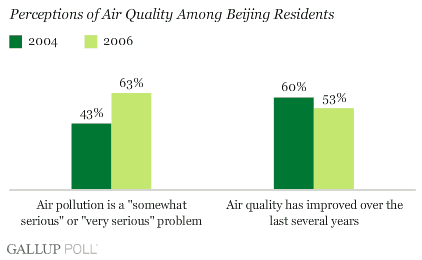GALLUP NEWS SERVICE
PRINCETON, NJ -- When Beijing, China won the bid to host the 2008 Olympics, the city pledged to implement extreme measures to host an environmentally friendly "Green Olympics." To achieve this, Beijing would have to reduce the dangerous levels of air pollution caused by coal-burning factories and the nearly 3 million cars on its roads. City leaders promised that Beijing would meet World Health Organization (WHO) clean-air standards by the start of the 2008 Summer Olympics. Although air pollution levels have fallen dramatically in Beijing over the last eight years, only 66% of the days in 2006 were at an acceptable pollution level -- significantly below the 80% required by the WHO.
Trend data from questions relating to air pollution in Gallup's 2004 and 2006 surveys of China show that a rising number of Beijing's residents recognize the hazard that air pollution poses to their city. In 2004, 43% felt Beijing's air pollution was a "somewhat" or "very serious" problem. In 2006, this number jumped to 63%. In 2006, roughly half of Beijing's residents (53%) felt that air quality had improved in recent years, a decline from the 60% who said the same in 2004.

But these changing perceptions seem less likely to be a function of worsening conditions than of greater sensitivity to environmental concerns on the part of Beijing residents. Indeed, it's evident that improvements to air quality have been made: city officials have banished 4,000 buses and 30,000 taxis that did not meet strict pollution control standards, and numerous large factories have been closed down, upgraded, or relocated outside of the city. However, the Olympics may have raised residents' standards for the cleanliness of their surroundings -- a shift that bodes well for future environmental efforts in Beijing.
Survey Methods
Results are based on face-to-face interviews conducted during October 2006 with a randomly selected sample of 422 Beijing residents, aged 15 and older. For results based on these samples, one can say with 95% confidence that the maximum error attributable to sampling and other random effects is ±5 percentage points. In addition to sampling error, question wording and practical difficulties in conducting surveys can introduce error or bias into the findings of public opinion polls.
